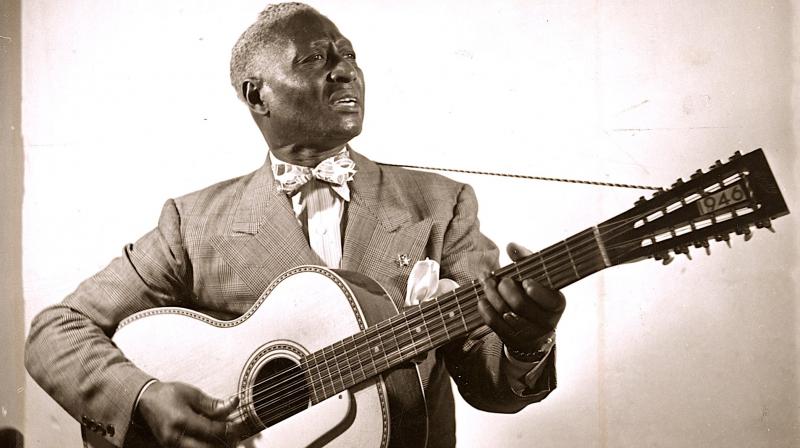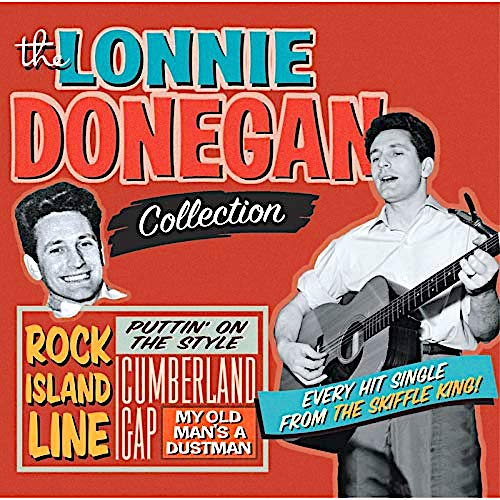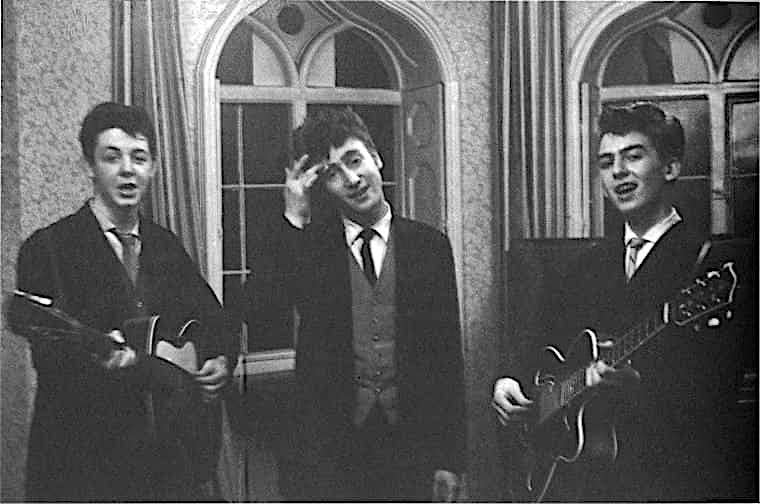Rock Island Line: The Song That Made Britain Rock, BBC Four review - the early dawn of Britpop | reviews, news & interviews
Rock Island Line: The Song That Made Britain Rock, BBC Four review - the early dawn of Britpop
Rock Island Line: The Song That Made Britain Rock, BBC Four review - the early dawn of Britpop
Billy Bragg travels back through the primeval swamps of skiffle and beyond

If you were a fan of “Rock Island Line” when it became a pop hit, you’d have to be at least in your mid-70s now. In 1956, Paul McCartney heard Lonnie Donegan perform it live in Liverpool, and Paul’s rising 77.
Billy Bragg dependably and articulately fronted up this BBC Four history of the song, a protest paean to, or (as it might once have been called) a Negro spiritual about, a railroad network begun in the mid-19th century. Trains eventually steamed to many points west, south and north of Chicago – Rock Island sits west of Chicago, on the east bank of the Mississippi.
 Those first recorded voices of the song belonged to black prisoners in Arkansas, way to the south. Key here was that another erstwhile convict, Huddie William Ledbetter – aka Lead Belly, who was violent but musically hugely influential on the 1950s and 1960s: Dylan references him on his first album – was present at the recording, clocked the performance and made the song his own. He died in 1949.
Those first recorded voices of the song belonged to black prisoners in Arkansas, way to the south. Key here was that another erstwhile convict, Huddie William Ledbetter – aka Lead Belly, who was violent but musically hugely influential on the 1950s and 1960s: Dylan references him on his first album – was present at the recording, clocked the performance and made the song his own. He died in 1949.
About 15 minutes in, after a roll call of those who felt the heat of the song – The Beatles not least of all – the tale started to resemble the Pyramids, or Indiana Jones. Responsible for said Arkansas prison recording was one John Lomax, a musicologist who in his hat and academic glasses evoked George Lucas’s whip-cracking archaeologist. A heavily bearded folk music researcher showed Bragg an extraordinary box containing the mechanism by which Lomax cut his recordings. It might have been something that Darwin took with him on the Beagle.
With Lead Belly having refined the song, enter Ken Colyer. He was a London-based New Orleans-obsessed trumpeter, who in the early 1950s by rather byzantine means, including jumping ship in Mobile, Alabama ended up playing with his jazz heroes on the Big Easy’s Bourbon Street. He was deported, then back in the UK linked up with Chris Barber. Barber is still alive and spoke to camera. His trad-jazz band, among others, helped foment in 1950s white teenagers a keen, and decidedly post-rationing, interest in African-American music.
That’s a potted version of an amazingly tangled sequence of transatlantic connections, which Bragg adeptly held together, though by halfway through a diagram or family tree wouldn’t have gone amiss. The film’s nub was skiffle – a word, according to Bragg, that was “obscure”, came from “African-American roots culture” and was a way of getting around the culturally-appropriating awkwardness of white musicians claiming they “play the blues”.
Lonnie Donegan was part of Barber’s troupe and had a solo smash in 1955 with a rivetingly energetic version of “Rock Island Line”, heard here in its entirety. Donegan emerged from skiffle. That was all about musical DIY: washboard for percussion, broom handle with string and empty tea-chest for bass, acoustic guitars. Bragg’s marvelling at skiffle’s ingenuity belied the fact that its paraphernalia resembles, today, degraded antiquities discovered in an old cupboard.
Sales of guitars when Donegan and his ilk hit the UK airwaves leapt from 5,000 to 250,000 a year. John Lennon formed the skiffle group The Quarrymen in late 1956 (pictured above, in 1958). Six months later, having chanced upon Paul, he was being told by his Little Richard-loving junior that to get ahead their band had to write their own stuff.
Paul should have been in this film. Instead, towards the end, a trio of amiable men who knew both John and Paul, recalled – in the Woolton church hall where the two met – how fast skiffle came and went. Bragg said it lasted 18 months. Donegan didn’t have much of a career afterwards, though a short contemporaneous interview clip with him underlined how vividly he felt the form was about fighting racial prejudice. It was a theme that got an airing in the film but remained unprobed.
As the credits rolled, we could probably have done without Bragg’s somewhat tuneless rendition of “Rock Island Line”. But by this point, even if throughout the film there had been a surfeit of detail, the Barking troubadour had made a solid case for the song’s pre-Beatles importance. Yet the question remains: why in the 21st century, research purposes aside, would anyone want to listen to it?
Add comment
The future of Arts Journalism
You can stop theartsdesk.com closing!
We urgently need financing to survive. Our fundraising drive has thus far raised £49,000 but we need to reach £100,000 or we will be forced to close. Please contribute here: https://gofund.me/c3f6033d
And if you can forward this information to anyone who might assist, we’d be grateful.

Subscribe to theartsdesk.com
Thank you for continuing to read our work on theartsdesk.com. For unlimited access to every article in its entirety, including our archive of more than 15,000 pieces, we're asking for £5 per month or £40 per year. We feel it's a very good deal, and hope you do too.
To take a subscription now simply click here.
And if you're looking for that extra gift for a friend or family member, why not treat them to a theartsdesk.com gift subscription?
more TV
 Murder Before Evensong, Acorn TV review - death comes to the picturesque village of Champton
The Rev Richard Coles's sleuthing cleric hits the screen
Murder Before Evensong, Acorn TV review - death comes to the picturesque village of Champton
The Rev Richard Coles's sleuthing cleric hits the screen
 Black Rabbit, Netflix review - grime and punishment in New York City
Jude Law and Jason Bateman tread the thin line between love and hate
Black Rabbit, Netflix review - grime and punishment in New York City
Jude Law and Jason Bateman tread the thin line between love and hate
 The Hack, ITV review - plodding anatomy of twin UK scandals
Jack Thorne's skill can't disguise the bagginess of his double-headed material
The Hack, ITV review - plodding anatomy of twin UK scandals
Jack Thorne's skill can't disguise the bagginess of his double-headed material
 Slow Horses, Series 5, Apple TV+ review - terror, trauma and impeccable comic timing
Jackson Lamb's band of MI5 misfits continues to fascinate and amuse
Slow Horses, Series 5, Apple TV+ review - terror, trauma and impeccable comic timing
Jackson Lamb's band of MI5 misfits continues to fascinate and amuse
 Coldwater, ITV1 review - horror and black comedy in the Highlands
Superb cast lights up David Ireland's cunning thriller
Coldwater, ITV1 review - horror and black comedy in the Highlands
Superb cast lights up David Ireland's cunning thriller
 Blu-ray: The Sweeney - Series One
Influential and entertaining 1970s police drama, handsomely restored
Blu-ray: The Sweeney - Series One
Influential and entertaining 1970s police drama, handsomely restored
 I Fought the Law, ITVX review - how an 800-year-old law was challenged and changed
Sheridan Smith's raw performance dominates ITV's new docudrama about injustice
I Fought the Law, ITVX review - how an 800-year-old law was challenged and changed
Sheridan Smith's raw performance dominates ITV's new docudrama about injustice
 The Paper, Sky Max review - a spinoff of the US Office worth waiting 20 years for
Perfectly judged recycling of the original's key elements, with a star turn at its heart
The Paper, Sky Max review - a spinoff of the US Office worth waiting 20 years for
Perfectly judged recycling of the original's key elements, with a star turn at its heart
 The Guest, BBC One review - be careful what you wish for
A terrific Eve Myles stars in addictive Welsh mystery
The Guest, BBC One review - be careful what you wish for
A terrific Eve Myles stars in addictive Welsh mystery
 theartsdesk Q&A: Suranne Jones on 'Hostage', power pants and politics
The star and producer talks about taking on the role of Prime Minister, wearing high heels and living in the public eye
theartsdesk Q&A: Suranne Jones on 'Hostage', power pants and politics
The star and producer talks about taking on the role of Prime Minister, wearing high heels and living in the public eye
 King & Conqueror, BBC One review - not many kicks in 1066
Turgid medieval drama leaves viewers in the dark
King & Conqueror, BBC One review - not many kicks in 1066
Turgid medieval drama leaves viewers in the dark
 Hostage, Netflix review - entente not-too-cordiale
Suranne Jones and Julie Delpy cross swords in confused political drama
Hostage, Netflix review - entente not-too-cordiale
Suranne Jones and Julie Delpy cross swords in confused political drama

Comments
in my opinion the doc., was